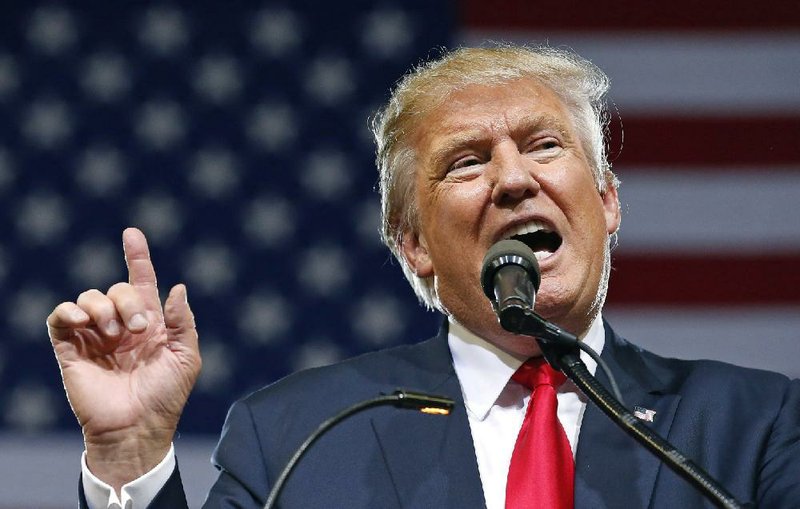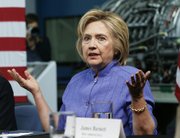WASHINGTON -- Donald Trump suggested Sunday that the United States should "seriously" consider profiling Muslims inside the country as a terrorism-fighting tool.
FULL ELECTION COVERAGE
"We really have to look at profiling," the Republican presidential candidate said in an interview broadcast Sunday on CBS' Face the Nation. "It's not the worst thing to do."
Trump said profiling is "something that we're going to have to start thinking about as a country."
"And other countries do it," he said. "You look at Israel and you look at others, and they do it, and they do it successfully."
Trump added that he hates "the concept of profiling, but we have to use common sense. We're not using common sense."
Trump has doubled down on his approach to fighting terrorism after Omar Mateen killed 49 people June 12 at a gay nightclub in Orlando, Fla. The attack, the deadliest mass shooting in modern American history, stoked a mix of fears about terrorism, guns and violence against gays.
Mateen's motive isn't clear, but a letter from the chairman of the Senate Homeland Security Committee, Republican Ron Johnson of Wisconsin, said Mateen wrote on Facebook that "real muslims will never accept the filthy ways of the west." Mateen also pledged allegiance to the Islamic State militant group. His ex-wife said he was mentally ill, and his father suggested that gays had angered him.
After the shooting, Trump said Muslims know where terrorists are but don't notify authorities. He also expanded his proposal for a temporary ban on Muslim immigration to include people from regions with a history of terrorism.
On Sunday, Trump said the government should investigate mosques in the U.S. in much the same way the New York Police Department's Demographics Unit spied on Muslims and mosques around the city with help from the CIA after the Sept. 11, 2001, terror attacks. Authorities assembled databases on where Muslims lived, shopped, worked and prayed; infiltrated Muslim student groups; put informants in mosques; and monitored sermons.
The New York Police Department, under Mayor Bill de Blasio, later abandoned the program after lawsuits and complaints.
"You do [it] as they used to do in New York prior to this mayor dismantling" the program, Trump said Sunday.
Trump also suggested that ethnic profiling could be useful for discerning trouble among what he said were the "tremendous numbers of people" who attend his rallies.
"People that obviously had no guns, no weapons, didn't know anything and they were going through screening, and they were going through the same ... scrutiny, the absolute same scrutiny as somebody else that looked like it could have been a possible person," Trump said. "So we really have to look at profiling."
Trump's proposals have been dismissed and criticized by many Republican leaders, including House Speaker Paul Ryan. Civil libertarians, Muslims and others have argued that profiling based on race, religion and other factors is unconstitutional and discriminatory.
Attorney General Loretta Lynch on Sunday said law enforcement agencies should not profile, but instead should remain allied with groups that might have helpful information.
"It is very important for us to maintain our contacts within the Muslim community because often individuals, if they're from that community and they're being radicalized, their friends and family members will see it first. They will see activity first. And we want that information to come to us," Lynch said on CNN's State of Union.
On Clinton emails
Lynch also said she doesn't believe that the FBI's investigation into Hillary Clinton's private email server has been compromised by President Barack Obama's endorsement of Clinton in the presidential race.
Some conservatives have said the endorsement puts pressure on law enforcement agencies that are trying to decide whether Clinton should be charged. The agencies are run by Obama's political appointees.
The FBI is investigating whether Clinton broke any laws during her four years as Obama's secretary of state by relying on a private email server instead of using a system owned and protected by the federal government.
"The investigation into the State Department email matter is going to be handled like any other matter," Lynch said on Fox News Sunday. "We've got career agents and lawyers looking at that. They will follow the facts and follow the evidence wherever it leads and come to a conclusion."
Lynch said she hasn't spoken about the investigation with Obama or "really with anyone" at the White House.
"That's not the kind of relationship that I have with people there, and it would be inappropriate to do so," she said.
Clinton's rival in the Democratic primary race, Sen. Bernie Sanders of Vermont, is expected to return to the Senate today. Because he is still an active candidate for president, he is expected to be accompanied by agents from the U.S. Secret Service.
Sanders' round-the-clock protection -- which includes agents at his home, on flights, in motorcades and marching alongside him during a gay-pride event -- can cost taxpayers more than $38,000 a day.
The Secret Service declined to discuss Sanders' protection on the record.
"He's still a candidate for president, so we continue to protect him," said one agent, who requested anonymity because he is not authorized to speak for the agency.
Aides to Sanders say he is most focused now on trying to parlay his strong performance in the Democratic primaries into changes to the party's platform and legislative agenda. Yet even if Clinton adopts ideas such as tuition-free college, Sanders has no plans to suspend his campaign before the convention, said Jeff Weaver, Sanders' campaign manager.
Jim Manley, a longtime Democratic operative who is supporting Clinton, said he thinks there's a broader explanation for why Sanders remains a candidate.
"He is just so convinced of the righteousness of his cause that I think he is having trouble giving it all up," Manley said.
Mary Anne Marsh, a Democratic strategist, had a similar view of Sanders' refusal to suspend his bid for the White House.
"There are only two options," Marsh said. "He doesn't want to land the plane, or he doesn't know how to land the plane."
Information for this article was contributed by Laurie Kellman of The Associated Press and by Amber Phillips, John Wagner, Abby Phillip and Karen Tumulty of The Washington Post.
A Section on 06/20/2016

